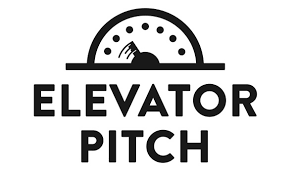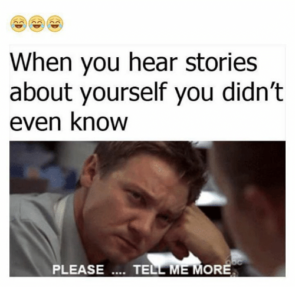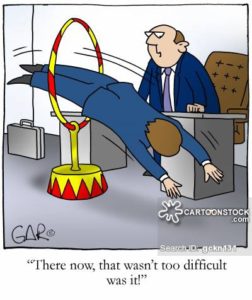Success in D.C. is centered on meeting people and building connections. One of the most difficult parts of making it in D.C. is being able to quickly and clearly articulate what you want to do. I have met with dozens of people and asked the simple question “what do you want to do”only to have them nearly fall over trying to come up with something.
I too have struggled with this question  because like many of you I have a wide array of interests. When I first moved to D.C. I never knew how to answer that question because so many things about government and politics interested me. In the beginning anything at the State Department seemed like my dream job but I was often embarrassed to say that. So naturally I did what several online career coaches/gurus teach and I developed elevator pitches, which inevitably lead to failure for several reasons.
because like many of you I have a wide array of interests. When I first moved to D.C. I never knew how to answer that question because so many things about government and politics interested me. In the beginning anything at the State Department seemed like my dream job but I was often embarrassed to say that. So naturally I did what several online career coaches/gurus teach and I developed elevator pitches, which inevitably lead to failure for several reasons.
Reason 1: When it comes to initial networking most people do not want to be pitched. An elevator pitch is you selling yourself to someone else trying to explain why they need you. This is a great skill when you have landed an interview but not when you are simply grabbing a coffee or being introduced over email. Nobody likes to be sold to anymore. We are the generation that mutes or fast forwards commercials and installs add blocks on our computers.
Reason 2: People prefer to hear stories! There is a reason that almost all major religions’ teachings are through stories. People want a narrative not facts or lists.
Reason 3: My elevator pitch never worked because it was all about me! Sure in interviews I would include information about how I can help the company, which is great, but in networking I was always focused on myself. I am not the only one who has made this mistake. I know this because of the 200 plus students/recent grads I’ve met with I think only one has ever asked more than one question about me.
When Career Investors got up to about 15 members I asked the attendees at a workshop to write a brief pitch/statement introducing themselves to the group and sharing their goals.
Some form of the word ‘I’(‘I’m or I’ll) was used 42 times. Some form of the word ‘me’ (myself, my, or mine) was used 25 times for a grand total of 67 times. The words ‘we’ or ‘us’ were never used and the words ‘you’ or ‘you all’ were used 3 times.
If you do not understand why this doesn’t work think of it this way.
My wife and I recently went to visit our newlywed friends. While sitting around my wife discovered a massive photo album. She sat for over an hour with our friend and looked at every picture. I couldn’t understand why she cared so much about their pictures. Then after nearly an hour she got really excited and said, “Look Tommy here is a picture of us!” Then a few minutes later, “look here we are again!” As we drove home she said “I loved that we were in four pictures considering we haven’t known them that long.”
We all do the same thing. We love to look at pictures when we think we might be in them. I have a friend who tells the same stories over and over even if everyone has heard them before. My wife pointed out to me recently “you know you always get annoyed when he tells a story except when he tells a story about you.”
So if we know people do not want pitches, they like stories (like the two I just told), and they want to hear about themselves, then tell them a story about themselves that lets them get to know you…make it ‘our story.’
Most of the pitches I received read exactly the same. “I am originally from X and I went to school at X. I majored in X and plan to move to D.C. upon graduation. I really want to do something different with my life and pursue my dreams in D.C. I hope through this group I can learn the right skills and make good connections to help launch my career.”
Instead, I coach Career Investors members to talk about themselves this way: “Hello, much like all of you I am still working on my undergraduate degree and like some of you I attend the University of X. Just like all of you I dream of building a career in D.C. after graduation but am not sure where to begin. I know we all share a similar wish to do something different with our lives and we share the common dream of making DC a reality. I look forward to learning from each of you and hope to make D.C. a reality for all of us.” See how the second one is ‘our story?’ The second example creates investment and personal commitment from the others who read it. This is an important skill to practice, as you will often be introduced via email to new people. Find any way you can to tell ‘our story.’
In person meetings can be more difficult. Recently I was connected to a woman who works in intelligence but also worked on campaigns. My first thought was to tell her how I had done similar work and tell her all about myself but instead I made ‘my story’ ‘our story.’ When I met her for coffee I said “I am really glad you agreed to meet with me. Sarah says you all met at the State Department. Did you both work in the same office?”
I let her tell the story of how she knew our  common contact and did not interrupt to explain how I knew Sarah. Eventually she asked me and I told her. I then said “I see you went to Alabama. I went down to a game there once and I had a blast!” She told me a few stories then asked why I had been in Alabama. I explained that I went to Arkansas and was at Alabama to watch Arkansas play there. By the end she was more than eager to help me because she was able to talk about herself and tell me stories.
common contact and did not interrupt to explain how I knew Sarah. Eventually she asked me and I told her. I then said “I see you went to Alabama. I went down to a game there once and I had a blast!” She told me a few stories then asked why I had been in Alabama. I explained that I went to Arkansas and was at Alabama to watch Arkansas play there. By the end she was more than eager to help me because she was able to talk about herself and tell me stories.
She probably did not learn as much about me as I would have hoped but everything she did learn also related back to her in some way. Most importantly she left the conversation happy and wanting to help me. I was not overly shocked when she introduced me to several other useful people, all of which said she had really great things to say about me!
Please join the D.C. Hopefuls Newsletter!
Like us on Facebook at D.C. Hopefuls Facebook Page
Follow us on twitter at @dchopefuls
CLICK HERE to schedule a 30-minute conversation with me about your career aspirations, struggles, and/or questions

 Everyone likes to feel like a hero and you can use that! When you are networking it is so important to take people’s advice and update them on how it played out because it makes them feel like your success or just general journey is in part because of them. Each new contact, interview, or lead you get try to make it about them if you can (see
Everyone likes to feel like a hero and you can use that! When you are networking it is so important to take people’s advice and update them on how it played out because it makes them feel like your success or just general journey is in part because of them. Each new contact, interview, or lead you get try to make it about them if you can (see 
 because like many of you I have a wide array of interests. When I first moved to D.C. I never knew how to answer that question because so many things about government and politics interested me. In the beginning anything at the State Department seemed like my dream job but I was often embarrassed to say that. So naturally I did what several online career coaches/gurus teach and I developed elevator pitches, which inevitably lead to failure for several reasons.
because like many of you I have a wide array of interests. When I first moved to D.C. I never knew how to answer that question because so many things about government and politics interested me. In the beginning anything at the State Department seemed like my dream job but I was often embarrassed to say that. So naturally I did what several online career coaches/gurus teach and I developed elevator pitches, which inevitably lead to failure for several reasons. common contact and did not interrupt to explain how I knew Sarah. Eventually she asked me and I told her. I then said “I see you went to Alabama. I went down to a game there once and I had a blast!” She told me a few stories then asked why I had been in Alabama. I explained that I went to Arkansas and was at Alabama to watch Arkansas play there. By the end she was more than eager to help me because she was able to talk about herself and tell me stories.
common contact and did not interrupt to explain how I knew Sarah. Eventually she asked me and I told her. I then said “I see you went to Alabama. I went down to a game there once and I had a blast!” She told me a few stories then asked why I had been in Alabama. I explained that I went to Arkansas and was at Alabama to watch Arkansas play there. By the end she was more than eager to help me because she was able to talk about herself and tell me stories. If you become complacent because you think you are set, you are setting yourself up for a disaster. I heard sharks never stop swimming or else they will drown, which I always assumed was not true but the internet has informed me for some
If you become complacent because you think you are set, you are setting yourself up for a disaster. I heard sharks never stop swimming or else they will drown, which I always assumed was not true but the internet has informed me for some